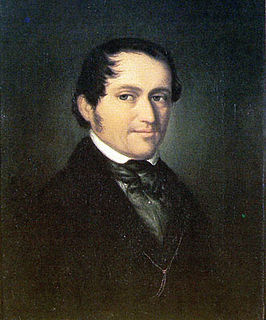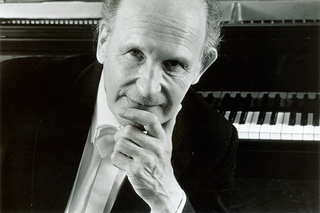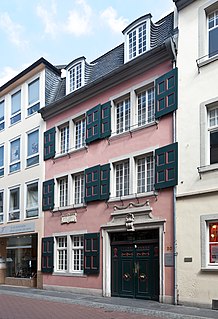
Johannes Brahms was a German composer, pianist, and conductor of the mid-Romantic period. Born in Hamburg into a Lutheran family, he spent much of his professional life in Vienna. He is sometimes grouped with Johann Sebastian Bach and Ludwig van Beethoven as one of the "Three Bs" of music, a comment originally made by the nineteenth-century conductor Hans von Bülow.

Robert Schumann was a German composer, pianist, and influential music critic. He is widely regarded as one of the greatest composers of the Romantic era. Schumann left the study of law, intending to pursue a career as a virtuoso pianist. His teacher, Friedrich Wieck, a German pianist, had assured him that he could become the finest pianist in Europe, but a hand injury ended this dream. Schumann then focused his musical energies on composing.

Clara Josephine Schumann was a German pianist, composer, and piano teacher. Regarded as one of the most distinguished pianists of the Romantic era, she exerted her influence over a 61-year concert career, changing the format and repertoire of the piano recital from displays of virtuosity to programs of serious works. She also composed solo piano pieces, a piano concerto, chamber music, choral pieces, and songs.

Zwickau is, with around 89,000 inhabitants, the fourth-largest city of the Free State of Saxony after Leipzig, Dresden and Chemnitz and it is the seat of the Zwickau District. The West Saxon city is situated in the valley of the Zwickau Mulde, and lies in a string of cities sitting in the densely populated foreland of the Elster and Ore Mountains stretching from Plauen in the southwest via Zwickau, Chemnitz and Freiberg to Dresden in the northeast. From 1834 until 1952, Zwickau was the seat of the government of the south-western region of Saxony.

Joseph Joachim was a Hungarian violinist, conductor, composer and teacher who made an international career, based in Hanover and Berlin. A close collaborator of Johannes Brahms, he is widely regarded as one of the most significant violinists of the 19th century.

Sir William Sterndale Bennett was an English composer, pianist, conductor and music educator. At the age of ten Bennett was admitted to the London Royal Academy of Music (RAM), where he remained for ten years. By the age of twenty, he had begun to make a reputation as a concert pianist, and his compositions received high praise. Among those impressed by Bennett was the German composer Felix Mendelssohn, who invited him to Leipzig. There Bennett became friendly with Robert Schumann, who shared Mendelssohn's admiration for his compositions. Bennett spent three winters composing and performing in Leipzig.

Niels Wilhelm Gade was a Danish composer, conductor, violinist, organist and teacher. Together with Johan Peter Emilius Hartmann, he was the leading Danish musician of his day.

Johann Gottlob Friedrich Wieck was a noted German piano teacher, voice teacher, owner of a piano store, and author of essays and music reviews. He is remembered as the teacher of his daughter, Clara, a child prodigy who was undertaking international concert tours by age eleven and who later married her father's pupil Robert Schumann, in defiance of her father's extreme objections. As Clara Schumann, she became one of the most famous pianists of her time. Another of Wieck's daughters, Marie Wieck, also had a career in music, although not nearly so illustrious as Clara's. Other pupils included Hans von Bülow.

John Vallier was an English classical pianist and composer who was known for his thundrous technique and beautiful singing tone, and was especially admired for his interpretations and performances of Chopin and Schumann. He could trace his musical ancestry in an eminently distinguished line back to the Romantic Era of the 19th century. He was born in 1920 and was only four years old when he appeared in public for the first time, at London's Wigmore Hall. His last solo recital at London's Royal Festival Hall was attended by HM The Queen Mother.

The Beethoven House in Bonn, Germany, is a memorial site, museum and cultural institution serving various purposes. Founded in 1889 by the Beethoven-Haus association, it studies the life and work of composer Ludwig van Beethoven.

Jozef De Beenhouwer is a Belgian pianist, music teacher and musicologist.

The Bach House in Eisenach, Thuringia, Germany, is a museum dedicated to the composer Johann Sebastian Bach who was born in the city. On its 600 m2 it displays around 250 original exhibits, among them a Bach music autograph. The core of the building complex is a half-timbered house, ca. 550 years old, which was mistakenly identified as Bach's birth house in the middle of the 19th century. In 1905, the Leipzig-based Neue Bachgesellschaft acquired the building. In 1907, it was opened as the first Bach museum.
Robert Schumann wrote his Arabeske in C major, Op. 18 in 1839 when he was 29 years old, dedicating it to Frau Majorin Friederike Serre auf Maxen, to whom he also dedicated his Blumenstück in D-flat, Op. 19. In the autumn of 1838 Schumann had left Leipzig for Vienna. His relationship with Clara Wieck had reached a point of no return, as her father vehemently opposed anything that might interfere with his daughter's career as a pianist and strongly disapproved of Schumann as a possible son-in-law. Geographically yet not emotionally detached from Clara, he was able to communicate with her only through letters and in his own music. This has been proposed as an explanation for this work, which alternates passages of wistful longing with more robust, declamatory episodes.
Sophie Pacini is a German-Italian pianist.
Hélène Boschi was a Franco-Swiss pianist, born in Lausanne. She studied with Yvonne Lefébure and Alfred Cortot at the Ecole normale de musique in Paris. Throughout her life she led a dual career as a teacher and as a performer.
Hans Joachim Köhler is a German musicologist.
Thomas Synofzik is a German musicologist. He is director of the Robert Schumann House in Zwickau.

The Schumann House is a cultural site in Leipzig in Germany. The musicians Robert Schumann and his wife Clara lived here for their first four years of marriage; there are now exhibition rooms in their former apartment, about their life and work.















